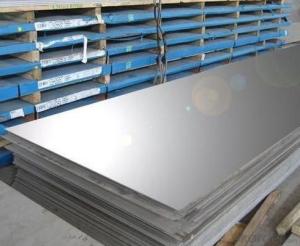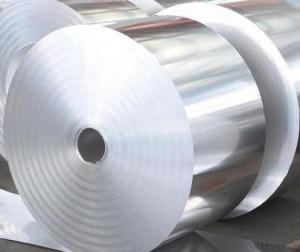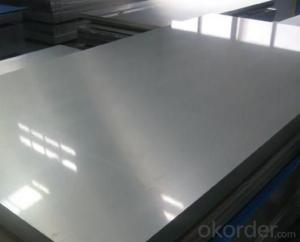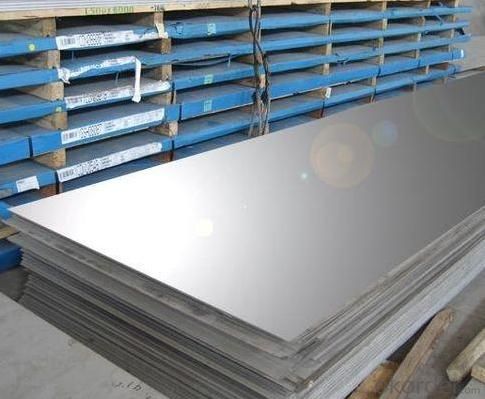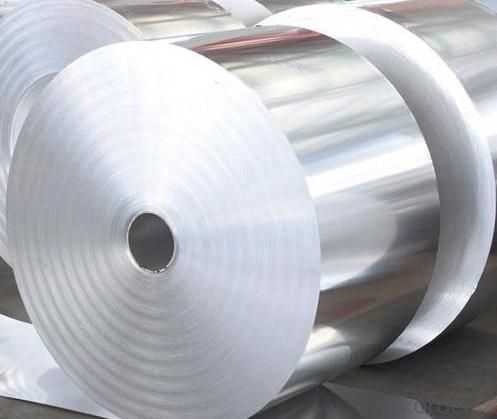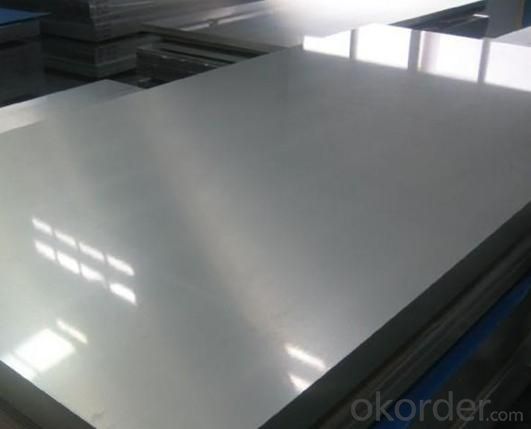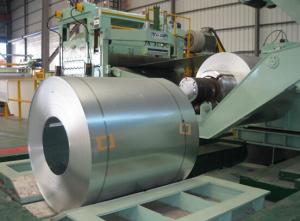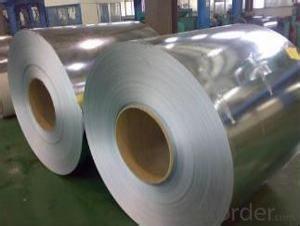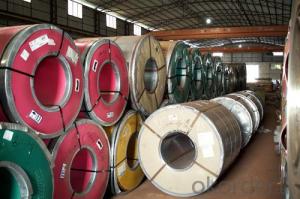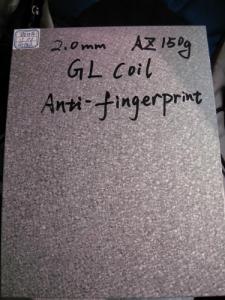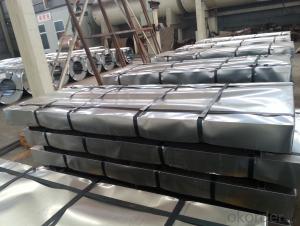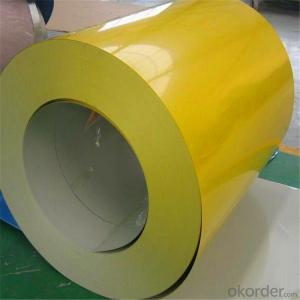Electro- Galvanized Steel Sheet in Coils
- Loading Port:
- Tianjin
- Payment Terms:
- TT OR LC
- Min Order Qty:
- 25 m.t.
- Supply Capability:
- 5000 m.t./month
OKorder Service Pledge
OKorder Financial Service
You Might Also Like
1.Structure of Electro- Galvanized Steel Sheet in Coils Description:
Hot-dip galvanized steel coils are available with a pure zinc coating through the hot-dip galvanizing process. It offers the economy, strength and formability of steel combined with the corrosion resistance of zinc. The hot-dip process is the process by which steel gets coated in layers of zinc to protect against rust. It is especially useful for countless outdoor and industrial applications. Production of cold formed corrugated sheets and profiles for roofing, cladding, decking, tiles, sandwich walls, rainwater protective systems, air conditioning duct as well as electrical appliances and engineering.
2.Main Features of the Electro- Galvanized Steel Sheet in Coils:
• Excellent process capability
• Smooth and flat surface
• Workability, durability
• Excellent anticorrosive property
• High strength
• Good formability
• Good visual effect
3.Electro- Galvanized Steel Sheet in Coils Images
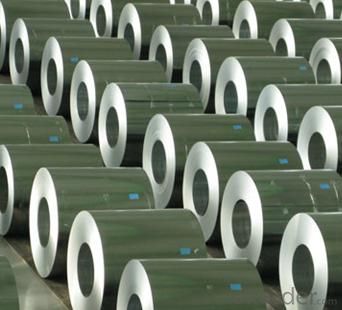
4.Electro- Galvanized Steel Sheet in Coils Specification
Standard: ASTM, JIS,EN
Grade: CS, DX51D+Z,SGCC, SS 230~550,S220GD+Z~S550GD+Z, SGC340~SGC570
Thickness: 0.1mm~5mm
Width: max 2000mm
Coil weight:3-12 MT
Coil ID:508/610mm
Surface structure: zero spangle, regular spangle or minimum spangle
Surface treatment: Chromate treatment, Oiled/dry, skinpassed/non-skinpassed
Packing: Standard seaworthy export package
Technology test results:
Processability | Yield strength | Tensile strength | Elongation % | 180°cold-bending |
Common PV | - | 270-500 | - | d=0,intact,no zinc removal |
Mechanical interlocking JY | - | 270-500 | - | d=0,intact,no zinc removal |
Structure JG | >=240 | >=370 | >=18 | d=0,intact,no zinc removal |
Deep drawn SC | - | 270-380 | >=30 | d=0,intact,no zinc removal |
EDDQ SC | - | 270-380 | >=30 | d=0,intact,no zinc removal |
5.FAQ of Electro- Galvanized Steel Sheet in Coils
We have organized several common questions for our clients,may help you sincerely:
1.How about your company?
A world class manufacturer & supplier of castings forging in carbon steel and alloy steel,is one of the large-scale professional investment casting production bases in China,consisting of both casting foundry forging and machining factory. Annually more than 8000 tons Precision casting and forging parts are exported to markets in Europe,America and Japan. OEM casting and forging service available according to customer’s requirements.
2.How to guarantee the quality of the products?
We have established the international advanced quality management system,every link from raw material to final product we have strict quality test;We resolutely put an end to unqualified products flowing into the market. At the same time, we will provide necessary follow-up service assurance.
3. How long can we receive the product after purchase?
Usually within thirty working days after receiving buyer’s advance payment or LC. We will arrange the factory manufacturing as soon as possible. The cargo readiness usually takes 15-30 days, but the shipment will depend on the vessel situation.
- Q: What are the common applications of cold-rolled steel coils?
- Cold-rolled steel coils are commonly used in various applications such as automotive components, appliances, construction materials, and general manufacturing.
- Q: How are steel coils used in the production of agricultural implements?
- Steel coils are used in the production of agricultural implements by being transformed into various components such as blades, plows, and harrows. These components are then incorporated into the implements, enabling them to till the soil, plant seeds, and perform other tasks necessary for agricultural operations.
- Q: I have a steel support beam can you remove one of the poles . the steel beam set on sender blocks on both side of the foundation. I have three steel beams support beam across the basement,I just want to remove one pole, can that be done.
- i would say no. it sounds like it is a baring wall. so if you take out one pole it is going to weaken the entire house.
- Q: Can steel coils be used in the production of electrical components?
- Yes, steel coils can be used in the production of electrical components. Steel coils are often used as magnetic cores in transformers and inductors. The magnetic properties of steel make it an ideal material for enhancing the efficiency and performance of electrical components. The coils are wound around the steel core, which helps to concentrate and direct the magnetic field, ensuring smooth and efficient operation. Steel coils are also used in the production of solenoids, motors, generators, and other electrical devices where magnetic fields are crucial for their functionality. Overall, steel coils play a vital role in the production of various electrical components, contributing to their reliable and efficient operation.
- Q: How are steel coils processed for further use?
- Steel coils are typically processed for further use through a series of steps. First, the coils are uncoiled and fed into a machine that straightens and levels them. Then, the steel is cut into the desired length and width. Next, the edges are trimmed and any defects are removed. The coils are then cleaned, treated, and coated to enhance their corrosion resistance and appearance. Finally, the processed coils are either stored or transported to manufacturers who transform them into various products such as automotive parts, appliances, construction materials, and more.
- Q: How are steel coils used in the production of electronic devices?
- Steel coils find extensive application in the production of electronic devices, serving various purposes. One prominent utilization lies in the manufacturing of transformers and inductors, which constitute essential components in numerous electronic devices. These components comprise a coil of wire wound around a core, with steel coils often serving as the core material due to their magnetic properties. The magnetic properties of steel contribute to amplifying the magnetic fields generated by the coils, facilitating effective energy transfer and voltage regulation. Steel's magnetic attributes, such as high permeability and low hysteresis loss, make it an ideal material for such applications. Furthermore, steel coils are also integral to the production of printed circuit boards (PCBs). PCBs, acting as the backbone of most electronic devices, consist of a flat, non-conductive board like fiberglass, adorned with a thin layer of copper traces etched onto it. These copper traces establish the electrical connections between different components on the board. Steel coils play a role in the PCB fabrication process, specifically in the creation of stencils. These stencils are employed to apply solder paste onto the board before component placement. Laser-cut steel coils give rise to accurate and consistent stencil patterns, ensuring precise solder paste application. To summarize, steel coils fulfill a crucial function in the production of electronic devices. They are employed in the manufacturing of transformers and inductors, enhancing energy transfer and voltage regulation through their magnetic properties. Additionally, steel coils contribute to the fabrication of PCBs by creating stencils for solder paste application. Overall, the use of steel coils guarantees the efficient and dependable operation of electronic devices.
- Q: I want to make a chess set out of stainless steel, but I'm not sure what type of mold I need or where I can go to have the steel melted and molded for me. Any ideas? I live in Southern, NJ.
- stainless steel is really hard to work with and will be really expensive to pour as not too many foundries do that. As far as tools go, I know that for e.g.drilling stainless steel cobalt bits are best, but even they don't last for very long. If you use normal drill bits stainless steel will ruin them. So how much metal working skills do you have? I would suggest to use a material you have experience with. Or make a chess set from nuts and bolts. You can buy them from stainless steel and the assembly is easy. See links for a few examples and/or use google to find more.
- Q: I'm in the middle of a remodel and buying appliances. Is there any way to ensure that the stainless steel is the same tone if you get different brands?
- it doesn't really matter. I have all appliances in my kitchen stainless steel. All different makes never noticed the tone, I think it just depends on the grain. i clean my appliances side to side not up and down. Good question never thought about that.
- Q: How are steel coils used in the production of metal signage?
- The production of metal signage relies heavily on steel coils, which are indispensable components. These coils are typically crafted from top-notch steel and are available in various dimensions and widths. By utilizing steel coils, manufacturers can achieve efficient and cost-effective production methods. To commence the process, the steel coils are unraveled and fed into a machine known as a roll former or a metal press. This machine molds the steel into the desired shape and design for the signage. The malleability and moldability of the coils make them perfect for creating intricate and personalized signage designs. Once the steel has been shaped, it can undergo several treatments to enhance its appearance and durability. For instance, a layer of paint or powder coating can be applied to protect the steel from corrosion and provide an aesthetically pleasing finish. This protective coating can also be tailored to meet specific branding or design requirements. After the steel has been shaped and coated, it can undergo further processing to add features such as embossing or perforations. These additional details can amplify the overall visual appeal of the metal signage and make it truly stand out. Moreover, steel coils possess exceptional structural integrity, ensuring that the metal signage remains robust and long-lasting, even in harsh environmental conditions. This durability is particularly crucial for outdoor signage that needs to endure exposure to weather elements such as rain, wind, and sunlight. In conclusion, steel coils are indispensable in the production of metal signage. Their versatility, durability, and ease of manipulation make them the ideal material for creating customized designs. Whether the signage is intended for indoor or outdoor use, steel coils provide the necessary strength and aesthetic appeal needed for high-quality metal signage.
- Q: Are steel coils used in agricultural equipment manufacturing?
- Yes, steel coils are commonly used in agricultural equipment manufacturing. Steel coils are often used to produce various components and parts for agricultural machinery, such as plows, harvesters, tractors, and tillers. The use of steel coils in agricultural equipment manufacturing ensures durability, strength, and resistance to various environmental conditions, making them essential in this industry.
Send your message to us
Electro- Galvanized Steel Sheet in Coils
- Loading Port:
- Tianjin
- Payment Terms:
- TT OR LC
- Min Order Qty:
- 25 m.t.
- Supply Capability:
- 5000 m.t./month
OKorder Service Pledge
OKorder Financial Service
Similar products
Hot products
Hot Searches
Related keywords
